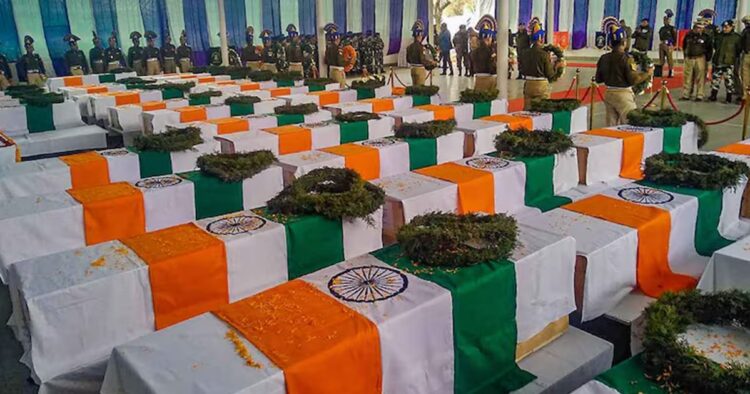When the soil is soaked in the blood of its protectors, the nation does not forget, it does not forgive. India’s warriors stand tall, their sacrifice etched in history, and their bravery roaring through the skies. The 2019 Pulwama attack—a suicide bombing on the Jammu-Srinagar highway shook India to its core. It was when Pakistan-based Jaish-e-Mohammed terrorists rammed an explosive-laden vehicle into a convoy of CRPF personnel, martyring 40 brave soldiers.
It was not just an assault on India’s security forces—it was an attack on the soul of the nation. This time, the response was not just words, but fire and fury.
The Attack That Shook India
The scale of the attack and its brazenness made it a defining moment in India’s counterterrorism approach. This was not just another terrorist strike; it was a declaration of war.
India had endured terror before—the Pathankot airbase attack, the Uri strike, the 26/11 Mumbai carnage—but Pulwama was different. It was the tipping point. The government, led by Prime Minister Narendra Modi, vowed a response that would be remembered. “Those responsible will pay a price they will never forget,” PM Modi had declared then, and India courageously delivered on that promise.
Balakot: A Bold Retaliation
Twelve days later following the tragic Pulwama terrorist attack, India struck back with unprecedented force. In a pre-dawn operation, the Indian Air Force carried out an airstrike deep inside Pakistan’s Balakot region, targeting a major Jaish-e-Mohammed terror camp.
It was the first time since the 1971 war that India crossed the border for an aerial attack, sending a clear message—India’s patience had run out and cross-border terrorism should never be tolerated.
Pakistan retaliated the next day, leading to an intense aerial battle. Wing Commander Abhinandan Varthaman, piloting a MiG-21 Bison, shot down an F-16 before being captured. Under immense global pressure, Pakistan was forced to release him, marking a diplomatic and military victory for India.
A New Era in Counterterrorism
Pulwama triggered a strategic shift in India’s security policies. Intelligence-sharing, surveillance, and counterterror laws were strengthened. The abrogation of Article 370 in August 2019 dismantled political barriers that had fueled terrorism in Jammu and Kashmir, allowing stronger counterterrorism operations.
Yet, challenges persist. Pakistan continues to shelter terror groups, rebranding them under new names. Radicalization through social media poses a growing threat. India cannot afford complacency.
The Balakot airstrike was a clear indication that India would not hesitate to cross borders if provoked. But beyond retaliation, since then, India’s focus has been on dismantling terror networks, countering propaganda, and securing its future. The nation must ensure that those who lay down their lives for its security are never forgotten.















Comments